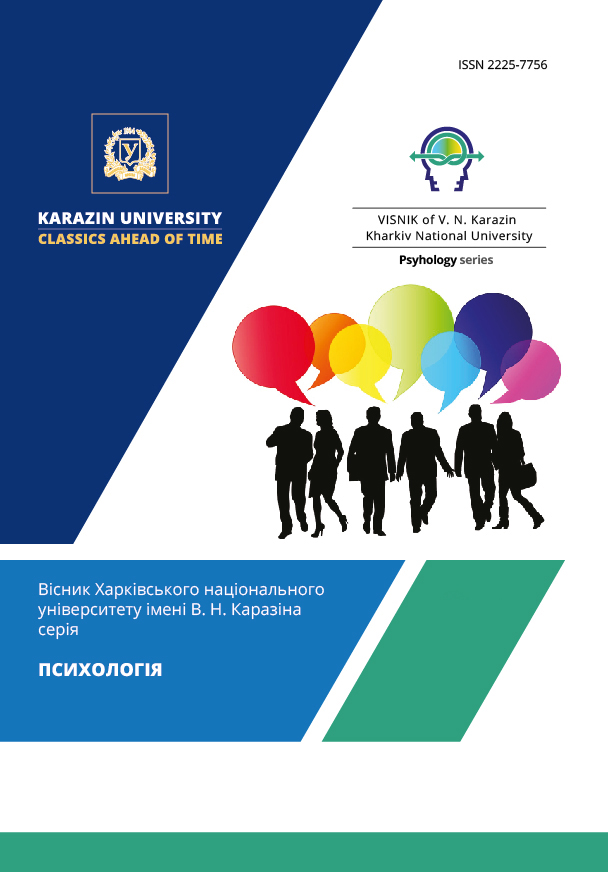Social and Psychological Characteristics of Individual Freedom Space
Abstract
The article is devoted to the analysis of social and psychological characteristics of individual freedom space. The concept of freedom, in terms of socio-psychological processes, is represented by three basic vectors: Forms of interpersonal interaction (community - society); Degree of probability (arbitrariness - given); The principle of social processes development (naturalness - artificiality). According to certain vectors, freedom finds its manifestation as: a natural process, which has many possibilities for deployment and is realized in a horizontal direction of interpersonal interaction. It is noted, that freedom is lost: in the process of institutionalization of organizational forms; with appearing of formalism, legitimacy, normative features, regulation; in the presence of hierarchy, subordination and vertical relationships in the group. It has been found out, that according to the vector, form of interpersonal interaction, freedom is mostly present in communities, which are united by a network principle. Civic organizations, communities, associations provide an opportunity for self-expression of the individual, since there is no dictate of group norms. According to this vector, freedom can be analyzed, not as an organization from community to society, but as a way of interaction of feelings, thoughts, actions, ways of thinking. It has been analyzed that according to the vector, the development of social processes, freedom is observed in everything, which is natural. It is a space of natural experiences, feelings and states, any artificiality and control is a sign of lack of freedom. It has been shown that according to the probability vector, freedom is manifested in the processes, where an arbitrary scenario is observed. This is a space for goal setting, building up one’s own activities. According to each vector, the degree of probability of freedom is analyzed.
Downloads
References
Список посилань
Кант, И. (1995). Метафизика нравов в двух частях. Метафизические начала учения о праве. (Ч.1.) – СПб.: Наука.
Тённис, Ф. (2002). Общность и общество: Основные понятия чистой социологии.CПб.: Владимир Даль.
Урри, Дж. (2012). Мобильности. Москва: «Праксис».
Фромм, Э. (2012).Бегство от свободы. Запорожье: Биг-Пресс.
Харарі, Ю.Н. (2012). 21 урок для 21 століття (2-ге вид.). Київ: Форс Україна.
Bland, A.M. (2020). Existential Givens in the COVID-19 Crisis. Journal of Humanistic psychology, 5(60), 710 724. https://doi.org/10.1177/0022167820940186.
Kleiber, D.A. (2020). Toward an applied social psychology of leisure. Journal of leisure research, 5(51), 618-625. https://doi.org/10.1080/00222216.2020.1807843.
Raveendhran, R., Fast, N.J.&Carnevale, P.J. (2020). Virtual (Freedom from) Reality: evaluation apprehension and Leaders’ preference for communicating through avatars. Computers in human behavior, 111, (106415). https://doi.org/10.1016/j.chb.2020.106415.
Testoni, I., Bortoloni, C., Pompele, S., Ronconi, L.&Baracco, G. (2020). A challenge for palliative psychology: freedom of choice at the end of life among the attitude of physicians and nurses. Behavioral sciences, 10(10). https://doi.org/10.3390/bs10100160.
References
Kant, I. (1995) Metaphysics of morals in two parts. Metaphysical principles of the doctrine of law (P.1.). Saint Petersburg: Nauka.
Tennis, F. (2002) Community and Society: Basic Concepts of Pure Sociology. Saint Petersburg: Vladimir Dal.
Urry, J. (2012) Mobility. Moskow: Praksis.
Fromm, E. (2012) Escape from freedom. Zaporizhzhia: Big-Press.
Harari, U.N. (2019) 21 lessons for 21 centuries(2th ed.). Kyiv: ForsUkraina.
Bland, A.M. (2020). Existential Givens in the COVID-19 Crisis. Journal of Humanistic psychology, 5(60), 710 724. https://doi.org/10.1177/0022167820940186.
Kleiber, D.A. (2020). Toward an applied social psychology of leisure. Journal of leisure research, 5(51), 618-625. https://doi.org/10.1080/00222216.2020.1807843.
Raveendhran, R., Fast, N.J.&Carnevale, P.J. (2020). Virtual (Freedom from) Reality: evaluation apprehension and Leaders’ preference for communicating through avatars. Computers in human behavior, 111, (106415). https://doi.org/10.1016/j.chb.2020.106415.
Testoni, I., Bortoloni, C., Pompele, S., Ronconi, L.&Baracco, G. (2020). A challenge for palliative psychology: freedom of choice at the end of life among the attitude of physicians and nurses. Behavioral sciences, 10(10). https://doi.org/10.3390/bs10100160.




